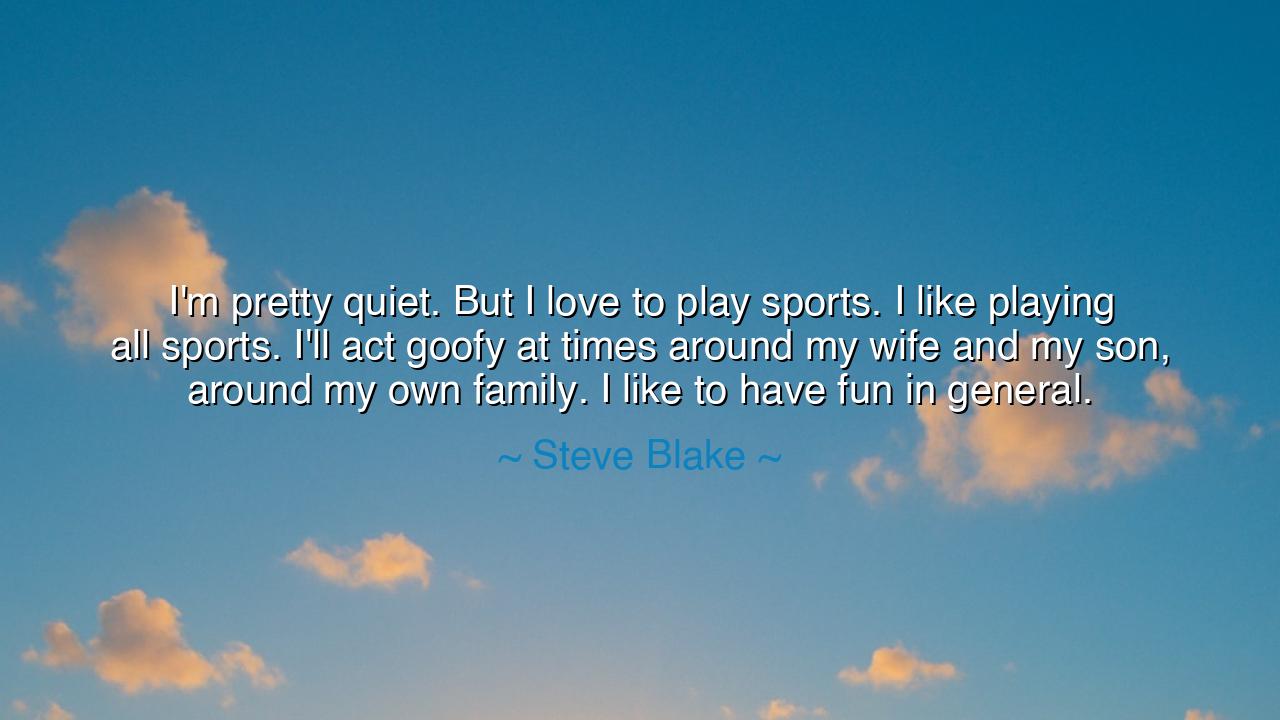
I'm pretty quiet. But I love to play sports. I like playing all
I'm pretty quiet. But I love to play sports. I like playing all sports. I'll act goofy at times around my wife and my son, around my own family. I like to have fun in general.






Steve Blake once spoke with honesty and humility: “I’m pretty quiet. But I love to play sports. I like playing all sports. I’ll act goofy at times around my wife and my son, around my own family. I like to have fun in general.” These words, though gentle in tone, resound with the strength of balance, revealing a life that treasures both simplicity and joy. They teach us that greatness is not only found in glory on the court but in laughter at home, not only in competition but in love.
The origin of this truth lies in the human need for wholeness. Many who walk the path of athletic pursuit are tempted to define themselves solely by victory, by discipline, by the roar of the crowd. But Blake’s words remind us that the truest identity is not bound only to the court of play. He acknowledges his quiet nature, revealing that strength does not always wear the cloak of noise or spectacle. It is in gentleness, in humility, in the joy of family, that a man finds his true grounding.
Consider the story of Marcus Aurelius, the Roman emperor, who despite ruling one of the greatest empires in history, was known for his reflective and quiet nature. In his private writings, he admitted that life’s deepest joys were not found in power but in philosophy, in simplicity, in time spent with his loved ones. Like Blake, Marcus Aurelius showed that the heroic man does not lose himself in public duty but remembers the sacred value of the personal and the intimate.
The mention of sports carries a deeper meaning as well. To say “I like playing all sports” is to confess a love not for triumph alone, but for movement, for the spirit of play itself. The ancients knew this joy: in the fields of Olympia, men ran not only to win but to celebrate the strength of their bodies and the beauty of their discipline. To embrace sports of every kind is to live in harmony with life’s variety, to honor the body as a temple of vitality and energy.
Yet perhaps the most touching element of this reflection is Blake’s confession of being goofy with his wife and son. Here lies the wisdom of the heart: that even the strongest warrior must set aside his armor and reveal his laughter, his tenderness, his playfulness. It is in these moments, not in trophies or records, that true wealth is found. For the ancients would say: what good is a crown of laurel if a man cannot bring joy to his household?
The emotional strength of Blake’s words lies in their humanity. He is not a hero who pretends to be larger than life; he is a man who delights in being human. His love of fun, his devotion to family, his embrace of quiet moments, all reveal a wisdom that transcends the temporary glories of sport. He shows that balance—between play and peace, between public life and private joy—is the secret to a life well lived.
The lesson we may take is this: do not measure yourself solely by your outward achievements. Cultivate the inner garden of joy, laughter, and intimacy. Be quiet when you must, but also allow yourself to be goofy, to be tender, to have fun. Honor your family, for they are the true audience of your heart, the ones who see you not as an athlete or worker, but as a soul who loves and is loved.
Practical action flows from this wisdom: each day, make time both for your work and for your joy. Do not scorn the simple act of play—whether in sports, in laughter, or in the moments you share with your loved ones. In doing so, you will find balance, and like Steve Blake, you will discover that the truest greatness lies not in applause or victory, but in the quiet, joyful rhythms of a life fully lived.






AAdministratorAdministrator
Welcome, honored guests. Please leave a comment, we will respond soon